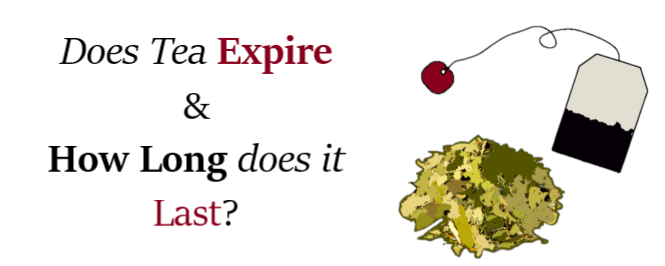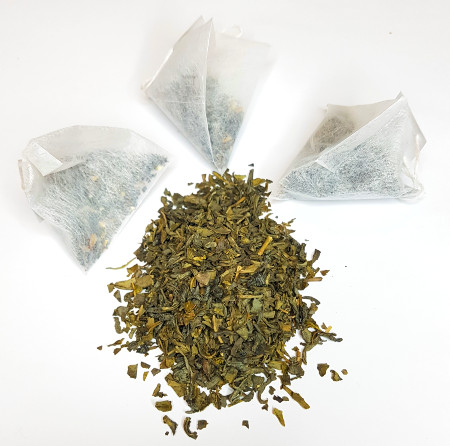
I immediately started doing research on whether tea can actually expire. If so, what could happen if you drank tea made with a tea bag that’s past its expiry date. Should you be worried and could expired tea make you sick?
I know that storage conditions and product quality are of great importance when discussing shelf life. But apart from that, does black tea last longer than green or, say, herbal tea? Does the brand matter? Could we say that DAVIDsTEA lasts longer than the tea offered by Bigalow, Lipton, or TAZO?
Moreover – do the beneficial compounds found in certain types of tea degrade with time?
Should you buy loose leaf tea to make sure that its freshness will remain for longer, or is it that it takes more time for tea bags to expire?
In this post, you will find all the answers, so let’s dive in.
Does Tea Expire?
Tea bags and loose leaf tea packets don’t actually expire, because they contain dried leaves. There’s no moisture which may spoil the product by attracting microorganisms, such as bacteria and mold.
Loose leaf tea packets and tea bags don’t have an expiry date printed on them; they have a ‘Best Before’ date which indicates quality rather than safety.
The ‘Best Before’ date shows the date before which your tea remains fresh in terms of flavor.
It may also indicate the period within which the tea’s beneficial compounds remain available. After that, they may start to degrade (you can find more on that later in the post).
With that being said, if the tea is exposed to moisture and other improper environmental conditions, its shelf life may be shortened and it may even become unusable.
How long does tea last?
If properly stored, tea bags and loose leaf tea packets last for 12 to 24 months.
After that, your tea will become notably less flavorful, sometimes even dull and stale.
If it’s a fruit tea, you should finish it up within 6 months after you’ve purchased it.
It’s important to note that different types of tea will last for different periods of time.
For example, it’s generally considered that black tea and oolong teas last longer than green tea.
If sealed, black tea may keep most of its flavor and aroma for up to 36 months after the purchase, while green tea goes notably stale after about 12 to 14 months even if kept in an unopened, airtight packet.
Furthermore, the shelf life of tea bags and loose leaf tea packets depends on the overall product quality. The higher the quality – the longer the tea will last.
Usually, relatively cheap supermarket teas would last for a shorter period compared to high-quality teas. This is so, not only because of the precision of processing, but also because of the way the tea has been packaged.
For example, some high-quality teas are sold in nitrogen-flushed sealed packets.
Flavor deterioration increases to a great extent when the tea is exposed to oxygen. The process of oxidation also leads to the development of unpleasant off-flavors, which becomes increasingly notable after tea expires. Nitrogen-flushing limits tea’s exposure to oxygen, thus preserving its flavor for longer.
The integrity of the dried tea leaves also plays a role in how long they may last
When tea leaves are broken there is a larger surface area that can be oxidized, which means that they will lose their flavor quicker.
Furthermore, most tea bags contain fannings and dust. Those are tiny leftover bits of tea that don’t usually carry an excellent flavor to begin with. On top of that, they oxidize very quickly and become more unpleasant relatively fast.
So following these thoughts you could say that whole loose leaf tea generally lasts much longer than tea bags.
Photo of different types of tea bags by Skitterphoto found on Pexels.com
Some brands offer high-quality tea bags that contain whole leaf or broken tea leaf pieces. They last longer than most widely-spread tea bags and are overall better at producing a cup of tea with pleasant flavor and aroma. Unfortunately, as you might’ve guessed, such high-quality tea bags are more expensive.
With all being said, even if loose whole-leaf, the longevity of tea depends on the storage conditions.
It’s always better to buy loose leaf tea in smaller quantities, as once you open the sealed packet, the tea’s exposure to oxygen will make it go bad faster.
In the following section regarding storage, you can find out how to make tea’s flavor last longer.
Such is the pu-erh tea. Some people would also succeed in aging oolong and certain types of black tea.
The concept of tea aging is becoming more popular and many people around the world are starting to experiment with it at their homes.
Evidently, as time goes by, some teas become more palatable. Of course, aging low-quality supermarket tea, won’t have the same effect. So if you plan on trying out tea aging, make sure you use high-quality tea leaves.
This way you would be able to fully enjoy the experience of having a cup of tea that’s made with more than 10 years old tea leaves. It may turn out to be even better than the fresh tea you’ve just bought.
How to store Loose leaf Tea and Tea Bags
To make tea last as long as possible you need to store it in a cool, dry, and dark place. It’s important to keep tea away from heat and moisture. If you have loose leaf tea, I recommend storing it in an airtight sealed, opaque container.
These airtight canisters by SilverOnyx are definitely among of the best ones for tea storage (click the link to check out their price on Amazon).
On the other hand, if you enjoy the convenience of using tea bags, you can store them in their original box, especially if individually sealed in envelopes. If the tea bags are not in envelopes that preserve their freshness for longer, I’d recommend storing them in an airtight, opaque container like the one by SilverOnyx I mentioned above.
Anyway, proper storage not only ensures that tea will last for longer in terms of flavor but also prevents the decomposition of the beneficial compounds of herbal and other types of tea.
Could old tea make you sick?
If tea has been stored away from heat, moisture, and direct sunlight it won’t go bad in a way that would make you sick. In that case, it’s generally considered safe to drink expired tea.
With that being said, if exposed to moisture and stored under improper conditions, loose leaf tea and tea bags may develop molds. If so, old tea may cause respiratory issues or other allergic reactions to those who are suffering from mold allergy.
Furthermore, tea may get contaminated with mycotoxins (secondary metabolites produced by molds). There are two main causes of their formation – either drought stress in winter (preharvest) or exposure to moisture and large temperature variations during storage (postharvest).
Mycotoxins in significant quantities may be toxic and have been linked to several detrimental effects on the well being of animals.
Nevertheless, there isn’t enough scientific evidence that defines the exact influence of mycotoxins on human health. Furthermore, even if contaminated with mycotoxins, old tea may not negatively impact your health.
After all, mycotoxins are found in various foods that we consume on a daily basis, such as nuts, cereal, and coffee, but not in concerningly high concentrations. You should not get too stressed out about the potential contamination.
Apart from their susceptibility to mold, dried tea leaves may also attract certain insects. For example, according to this scientific report dried chamomile tea may get damaged by beetles and larvae during storage.
Those insects pollute the chamomile tea with their waste and webs, which significantly lowers its quality and makes it pretty much unusable.
To prevent insect contamination, you should keep all types of tea well-sealed during storage.
Does tea lose its beneficial compounds during storage?
As time goes by, even if kept in an airtight sealed, opaque canister, the chemical makeup of tea changes, and it loses its beneficial compounds.
If you would like to take advantage of the health benefits linked to herbal, green, or, say, black tea, you should use it as soon after purchase as possible.
Unfortunately, the “Best before” dates printed on the tea packages of most brands refer to flavor, rather than beneficial potential.
Anyway, there are phytochemical substances in tea which are compounds that may posses health-promoting effects. It is, in fact, considered that the phytochemical content of green, black, white, and yellow dried tea leaves (all Camellia Sinensis varieties) may be maintained for 2 years if the product is properly stored.
Nevertheless, different types of tea have different bioactive compounds with a variety of different chemical structures.
More scientific studies should be conducted in order to determine how long those tea compounds last under different storage conditions.
Not all brands have the resource or the desire to sponsor such studies, which is why the manufacturers tend to stay away from any claims regarding the longevity of their products’ beneficial potential.
Anyway, even if you don’t mind the diminished flavor of expired tea, you should know that a large portion of the potential benefits linked to tea consumption may be gone past expiry.
Final Words
Now you know whether tea expires and how long it lasts. I hope that you found my tips on storage useful and that you learned something new along the lines of this guide.
If you’re wondering whether I’ve had the 2 years old green tea that I mentioned at the beginning of this post, the answer is – yes, I did. If you’re wondering whether I’ve ever used expired tea that’s over 2 years old, the answer remains the same. It was a peppermint tea bag and even though it was a bit stale I still liked it. It didn’t leave a bad taste in my mouth and it satisfied my need to have something soothing.
That being said, I would usually try to buy tea that I’m about to use in the next 6 months or so. This way I make sure that I always have a flavorful drink tea that still carries beneficial properties.
My experience has also thought me that loose leaf green tea starts to lose its flavor notably after about 2 months past opening the packet even if stored in an opaque, airtight canister. This doesn’t mean that it goes bad in two months. It means that after the second month you will likely notice a difference in the flavor. Still, it will be overall pleasant for at least a year if stored properly.
Anyway, leave me a comment below if you have any questions or simply share your experience!




